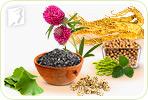
The stage of a woman's life leading up to menopause can bring a lot of change. Symptoms of menopause can include hot flashes, night sweats, exhaustion, weight gain, dry skin, and mood changes. Women are also at an increased risk of suffering from osteoporosis when they are menopausal and post-menopausal. However, there are some dietary changes women can make to reduce the symptoms of menopause.
Dietary Suggestions during Perimenopause
More calcium
Many people like to think of dairy foods as the only calcium-rich foods out there. While it is true that milk, cheese, and yogurt are rich in calcium, it is also important to include other calcium rich foods into your diet. This includes dark leafy greens, sardines, salmon, shrimp, and figs.
Drink green tea
Green tea is rich in antioxidants and phytochemicals which can provide numerous health benefits. If you get bored of green tea try different varieties and types of teas, which each provide a variety of health benefits. Tea can also be a low-caffeine and sugar-free alternative to energy drinks and sugary coffee drinks. Caffeine is known for triggering hot flashes and night sweats, so reducing your caffeine intake may help reduce these symptoms.

Phytoestrogens
These plant compounds mimic estrogen when introduced into the body and are found in various fruits, vegetables, legumes, soy products, nuts and seeds.
Dark leafy greens
Get three servings of dark leafy greens every week. This includes arugula, spinach, leaf lettuce, kale, collard greens, romaine lettuce, and chicory. Dark leafy greens are rich in fiber, folate, carotenoids, vitamin C, vitamin K, iron, calcium, and antioxidants. These veggies can also reduce a person's risk of getting certain cancers.
Reduce saturated fat
Reduce saturated fat intake and eliminate foods high in trans fats such as cookies, sweets, processed food, and fried foods.
Fruits and Vegetables
Eat five servings of fruits and vegetables a day. Fruits and vegetables are vital for a well-functioning digestive system and are chock full of nutrients and vitamins. Try to consume a variety of fruits and vegetables.
Omega 3 fatty acids

Omega 3 fatty acids, as found in oily fish like salmon and tuna, and some plants and nut oils, like olive oil. Omega 3 fatty acids are essential in helping to reduce memory loss, diminish risk of cardiovascular disease, improve circulation and decrease the likelihood of mood swings and depression before the onset of menopause. For healthy adults without a history of heart disease, the American Heart Association recommends eating fish twice weekly.
Recommendation
Eating a healthy and well-balanced diet is vital to having a happy life and to successfully aging. What you eat can also contribute or reduce your likelihood of experiencing menopause symptoms. Click to read more about the relationship between hormones and perimenopause.
Sources
- Lewin, J. (2014). Eat to Ease the Menopause. Retrieved December 3, 2015, from http://www.bbcgoodfood.com/howto/guide/eat-beat-menopause
- National Health Service. (2014). Healthy eating during the menopause. Retrieved December 3, 2015, from http://www.nhs.uk/Livewell/menopause/Pages/Themenopauseanddiet.aspx
- National Osteoporosis Foundation. (2015). A Guide to Calcium-Rich Foods. Retrieved December 3, 2015, from http://nof.org/articles/886
- University of Kentucky. (2013). The Health Benefits of Dark Green Leafy Vegetables. Retrieved December 03, 2015, from http://www2.ca.uky.edu/agc/pubs/FCS3/FCS3567/FCS3567.pdf



